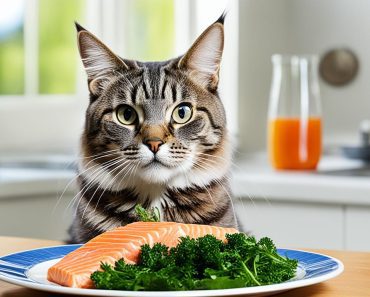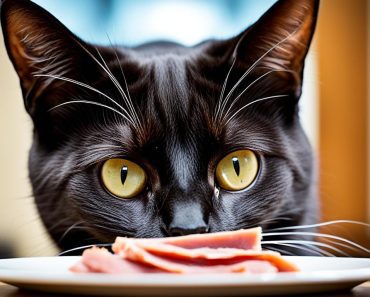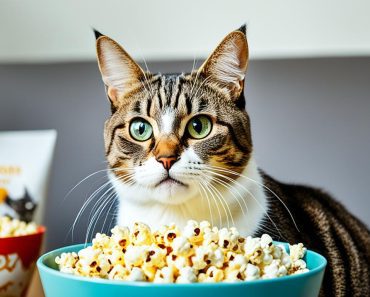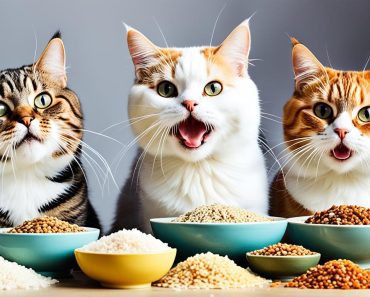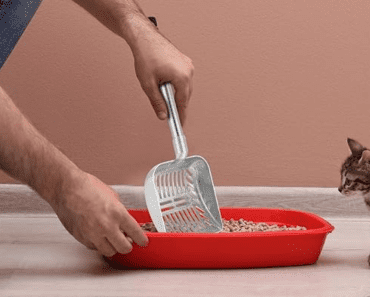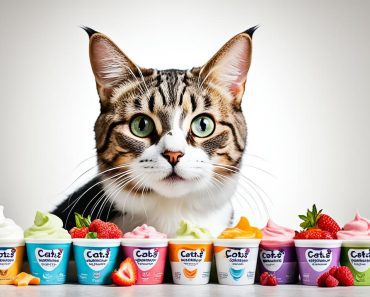Hello, fellow cat owners! As cat lovers, we always want to ensure that our feline companions have a safe and nutritious diet. In our quest to provide them with variety, we may wonder if cats can enjoy pork. So, can cats eat pork? Let’s explore the topic together!
When it comes to feeding cats pork, there are a few things to keep in mind. While it is safe for cats to consume pork, it’s crucial to offer them plain, lean, and thoroughly cooked pork. Processed pork or pork seasoned with spices and sauces should be avoided to prevent any adverse reactions or digestive issues.
It’s always a good idea to consult with a veterinarian to understand the dos and don’ts of feeding pork to your cat. They can provide personalized recommendations based on your cat’s specific needs and health conditions. Dr. Sarah Gorman, a veterinarian at Small Door Veterinary, suggests giving cats 1-3 small pieces of lean, unseasoned pork as a treat once a week or less. This feeding guideline follows the 10 percent rule, where treats and human food should make up no more than 10 percent of a cat’s daily calorie intake.
Can Cats Eat Pork? The short answer is yes, as long as it is prepared well.
- Cats can safely eat pork, but it should be plain, lean, and thoroughly cooked.
- Avoid giving cats processed pork or pork seasoned with spices and sauces.
- Consult with a veterinarian to ensure proper feeding guidelines for your cat.
- Offer cats lean, unseasoned pork as a treat once a week or less, following the 10 percent rule.
- Pork can provide high-quality protein and essential nutrients for cats in moderation.
How to Treat Your Cat to Pork
If you’re looking to treat your cat to some delicious pork, there are several options to consider. Here are a few ideas:
-
Boiled Pork Chops or Tenderloin: One simple option is to boil plain loin chops or tenderloin in water until fully cooked. Afterward, you can cut the pork into small, cat-friendly pieces and offer them as a tasty treat.
-
Porky Pops: Another fun way to treat your cat to pork is by making porky pops. Start by placing small bits of cooked pork in an ice cube tray. Fill the slots with cat-friendly broth and freeze. Your cat will love licking these frozen treats!
-
Baked Pork Bites: For a crunchy treat, you can make baked pork bites. Simply cut lean, plain pork into pea-sized pieces and bake them until they are cooked and crispy. Store them in the refrigerator or freezer for your cat to enjoy later.
Additionally, if you prefer the convenience of pre-made treats, there are commercial cat foods and cat treats available that include pork as a primary ingredient. These offer a quick and hassle-free way to pamper your feline friend with some porky goodness.
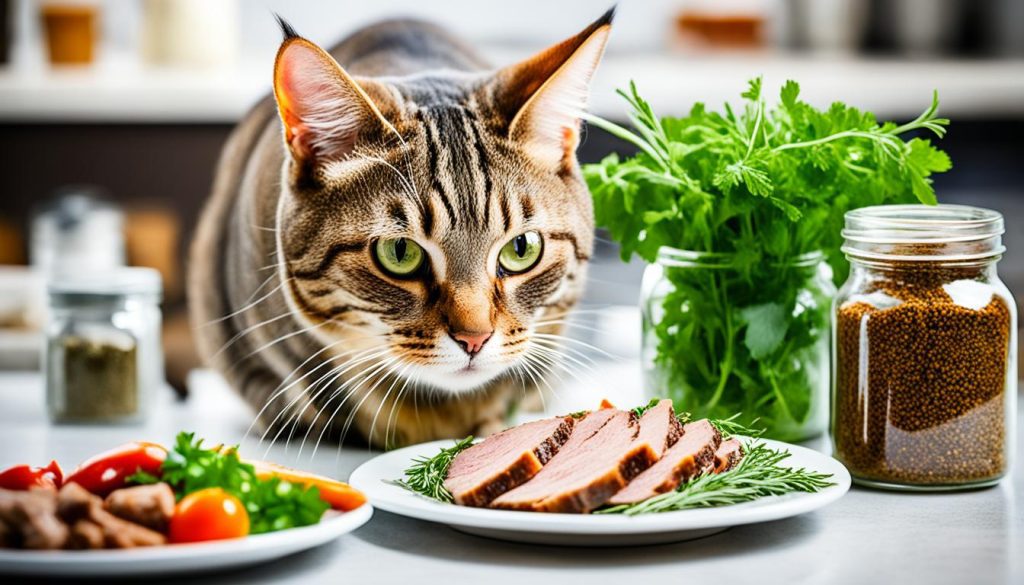
Remember, when treating your cat to pork, it’s important to ensure that it is plain, lean, and thoroughly cooked. Avoid seasonings, spices, and sauces that may be harmful to your cat’s health. With these tasty options and precautions in mind, you can safely indulge your cat with some porky delights!
Benefits of Pork for Cats
When fed appropriately, pork can offer several benefits to cats. It is a source of high-quality protein, essential amino acids like taurine and arginine, B vitamins (such as B6 and B12), and essential minerals like phosphorus and zinc.
Protein plays a crucial role in supporting various bodily functions in cats, including muscle growth, tissue repair, and the production of enzymes and hormones. As obligate carnivores, cats have a higher protein requirement compared to other animals, making pork a valuable source of this essential nutrient.
Taurine and arginine are amino acids that are vital for a cat’s overall health. Taurine, in particular, is important for maintaining healthy eyesight, cardiovascular function, and reproductive health in cats. Pork is a natural source of both these amino acids, making it a nutritious addition to a cat’s diet.
In addition to protein and amino acids, pork provides B vitamins, including B6 and B12. These vitamins play a crucial role in metabolic processes and energy production, supporting the overall well-being of cats.
Pork is also rich in essential minerals like phosphorus and zinc. Phosphorus is necessary for bone health, kidney function, and energy metabolism. Zinc is involved in numerous enzymatic reactions in the body and is important for immune function, skin health, and growth in cats.
Introducing pork into a cat’s diet can also add variety and serve as a high-value treat for training or positive reinforcement. The different flavors and textures of pork can help stimulate a cat’s appetite and provide them with a satisfying culinary experience.
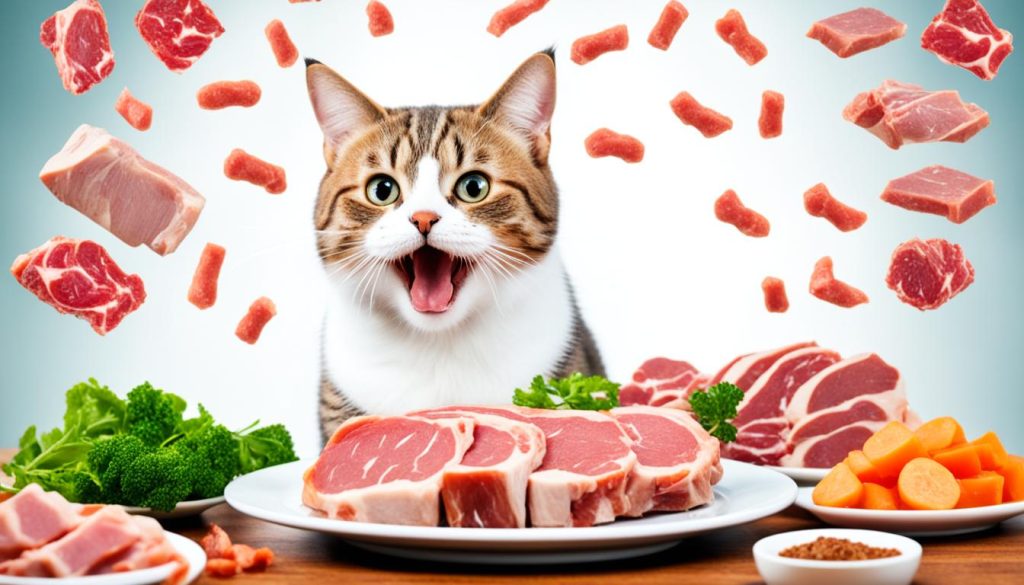
Nutrients in Pork for Cats
- High-quality protein
- Taurine and arginine
- B vitamins (B6 and B12)
- Essential minerals (phosphorus and zinc)
Risks of Giving Pork to Cats
While pork can have benefits when given as an occasional treat, there are also risks involved. It’s important to be aware of the potential dangers of feeding pork to cats to ensure their safety and well-being.
Pork and Parasites
One of the main risks of feeding pork to cats is the potential for parasites. Undercooked or raw pork can harbor parasites that are harmful to cats, such as roundworm. These parasites can cause digestive issues, weight loss, and in severe cases, organ damage. It’s crucial to thoroughly cook pork before offering it to your feline friend.
Pork Bones and Cats
Feeding cats pork bones can pose a significant threat to their health. Pork bones can splinter and cause choking hazards or internal injuries if swallowed. It’s essential to avoid giving your cat any bones to prevent the risk of obstruction or injury in their digestive tract.
Toxic Ingredients in Pork for Cats
Some ingredients commonly found in seasoned or processed pork can be toxic to cats. Seasonings like onion and garlic powders are toxic to felines and can cause damage to their red blood cells. Additionally, processed pork products may contain preservatives like sodium nitrites, which can be toxic in large quantities. It’s best to offer plain, unseasoned pork to ensure your cat’s safety.
Salt Intake and Cats
High salt intake from seasoned or pre-seasoned pork can be harmful to cats. Cats have a lower tolerance for sodium compared to humans, and excessive salt consumption can lead to increased thirst, urination, and even salt poisoning. It’s important to avoid offering excessively salty pork products to your cat.
To protect your cat’s health, it’s essential to feed pork to them in moderation and take precautions to ensure it is safe for consumption. Consulting with a veterinarian can provide further guidance on the risks associated with feeding pork to cats and help you make informed decisions about your cat’s diet.
How Often Can Cats Eat Pork?
Cats can enjoy pork as an occasional treat, typically once or twice a week. It’s essential to feed pork to cats in moderation, following the 10 percent rule for treats and human food. According to this rule, treats and human food should make up no more than 10 percent of a cat’s daily calorie intake.
By adhering to this guideline, you ensure that the majority of your cat’s diet consists of well-balanced cat food, which provides all the necessary nutrients for their health. Limiting the consumption of pork and other treats helps prevent health issues associated with overfeeding, such as obesity and digestive problems.
Feeding cats pork in moderation allows them to enjoy the taste and variety that treats provide without compromising their overall nutritional balance. It’s important to prioritize their primary diet and use pork as an occasional supplement to promote a healthy and balanced lifestyle for your feline friend.
Remember to consult with your veterinarian for personalized advice and to address any specific concerns or dietary restrictions your cat may have.
Conclusion
Cats can safely eat pork in moderation. Plain, lean, and thoroughly cooked pork can be offered to cats as an occasional treat. It provides high-quality protein, essential nutrients like B vitamins and minerals, and can add variety to a cat’s diet.
However, it’s important to be aware of the risks associated with feeding pork to cats. Undercooked or raw pork can contain parasites that are harmful to cats, while pork bones can pose a choking hazard and cause digestive blockages. Seasonings and toxic ingredients found in processed pork products should be avoided, as well as excessive salt intake.
To ensure the safety and appropriate feeding guidelines for your cat, it’s recommended to follow the 10 percent rule and consult with a veterinarian. By feeding pork to cats in moderation and taking necessary precautions, you can provide your feline companion with a tasty and nutritious treat while promoting their overall health and well-being.

